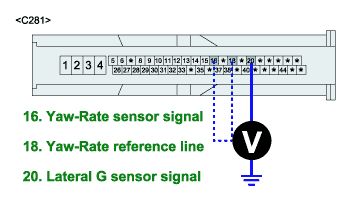Has a problem been found?
YES
Repair as necessary and then go to "Verification of Vehicle Repair" procedure.
NO
Go to "Power Circuit Inspection" procedure.
Many malfunctions in the electrical system are caused by poor harness(es) and terminals. Faults can also be caused by interference from other electrical systems, and mechanical or chemical damage.
Thoroughly check connectors for looseness, poor connection, bending, corrosion, contamination, deterioration, or damage.
Has a problem been found?
YES
Repair as necessary and then go to "Verification of Vehicle Repair" procedure.
NO
Go to "Power Circuit Inspection" procedure.
Ignition "ON" & Engine "OFF".
Measure voltage between terminal "16,18,20" of the HECU harness connector and chassis ground.
Specification : Approx. 2.5V ( Voltage between terminal "16,20" of the HECU harness connector and chassis ground.)
If the voltage of the yaw & lateral G sensor is changed within normal voltage range (approx. 0.1~4.9V) during shaking it, it is in normal condition.
Specification : Approx. above 2.1V and below 2.9V ( Voltage between terminal "18" of the HECU harness connector and chassis ground.)

Is the measured resistance within specifications?
YES
Substitute with a known-good HECU and check for proper operation. If problem is corrected, replace HECU and then go to "Verification of Vehicle Repair" procedure.
NO
Check for open or short in the Yaw Rate & Lateral G sensor harness between terminal "3,5,6" of the Yaw Rate & Lateral G sensor harness connector and terminal "16,18,20" of the HECU harness connector.
Repair as necessary and then go to "Verification of vehicle Repair" procedure.
If OK, Go to "Component Inspection" procedure.